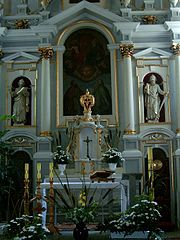
A History Of The Mass And Its Ceremonies In The Eastern And Western Church -Rev John O'Brien A.M.
CHAPTER XIII
THE TABERNACLE
THE small structure in the centre of the altar, resembling a church in appearance, is called the Tabernacle of the Blessed Sacrament. It is here that the Holy Eucharist is always reserved under lock and key; and so particular is the Church about the respect that should be paid it that the most minute directions are given regarding its exterior and interior ornamentation. In shape it may be square, hexagonal, heptagonal, or any other becoming form; but it must not be crowned with any profane devices, or be made so as to suggest anything else than the sacred purpose for which it is intended; hence, as far as can be, a cross should surmount its top, and its outside, if means admit, should be finished in gold. As wood is less liable to contract dampness than any other material, it is advisable to have the Tabernacle made of it; but if made of marble, metal, or any kind of stone, its inside at least should be lined with wood out of reverence for the Blessed Sacrament. No matter what its material be, the interior must always be covered over with silk, and a clean corporal must lie under the vessel in which the Blessed Sacrament is enclosed.
It is strictly forbidden to make the Tabernacle a base for anything to rest on, even though the thing were a reliquary containing a portion of the true cross or a relic of the greatest saint in heaven; and it is forbidden, too, to have any drawers over or under it for the purpose of keeping the holy oils or any utensils belonging to the altar or sanctuary. Upon no consideration can any empty vessels be kept within it, such as the chalice, ciborium, lunette, monstrance, or the like. Nothing, in fact, is allowed there but the sacred vessel containing the Blessed Sacrament; and if for any reason this should not be there, the door should be always open, in order that the people may not be deceived.
The Tabernacle should have two keys, made of gold or silver, or at least gilt, one of which should be kept by the pastor himself, the other by one of his priests.
A lamp fed with pure olive-oil must burn before it perpetually—a discipline which, as we have seen, prevails also in the Oriental Church, and by which we are reminded of the “perpetual fire” of Solomon’s Temple, and of that sacred mystic fire of divine charity with which our Lord’s heart ever burns in the adorable Sacrament of the Altar.
Copyright ©1999-2023 Wildfire Fellowship, Inc all rights reserved

 Keep Site Running
Keep Site Running